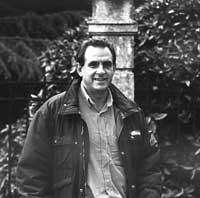Incineration provides no guarantee
1995/09/01 Zabala, Joserra Iturria: Elhuyar aldizkaria
Elhuyar: The Erreka Platform is working hard to prevent incineration of household waste. What is this attitude based on?
Bobi Galdos: To a large extent, if our attitude is critical, it can be said that the situation we suffer today is a consequence of the unfortunate situation. It is a direct consequence of the neglect that is taking place throughout the Basque Country. Landfills are filling up and public institutions have found a serious problem. What to do with garbage?
Although people think otherwise, this question is quite new among us. And the phenomenon of containers that are thrown away after use is quite new, because in a few years we have been able to assimilate them as always. In fact, the problem of landfills has arisen for 50 years. The most serious problem arose in Germany and the US, where the incinerators were first carried out.
Elhuyar: In short, what is incineration?
Bobi Galdos: That is, to burn the waste we generate in the homes. That said, it does not seem to be a bad idea, since it is evident that burning reduces the volume of waste. At the same time, the incineration process generates energy and also expanded the possibility that the ashes of incinerating plants were reused. Undoubtedly, incineration seemed the best system to prevent the problem of urban solid waste. However, it was soon observed that this was not so, as ash could not be used and the problem of its toxicity was expanded.
In addition, it is confirmed that the emissions generated by the incinerator are pollutants. This problem is more worrying because we do not know how these polluting elements appear, because we do not dominate the mechanisms of generation. However, many health problems have been shown to stem from abortions, birth defects, or certain types of cancer. For example, in some places in Germany, mothers have advised that newborns do not breastfeed for more than four months, as toxic elements resulting from incineration accumulate in fatty tissues.
Elhuyar: Are the toxic elements mentioned above defined?
Bobi Galdos: The exhaustive enumeration of all the elements causing the contamination is not easy since the emissions are very varied. The most common are CO 2, sulfur oxides, hydrochloric acid, nitrogen oxides. However, hydrocarbons present a higher level of risk. Only about 10% of cases are known, with a minimum of 75 types of furans and 135 dioxins, which can be combined up to five thousand different forms, leading to often unclassified products.
Elhuyar: Before you said that the problem of ashes is very serious...
Bobi Galdos: So it is, although so far little has been said about it. In Iparralde, there has recently been a strong controversy. For many, incineration has an enormous “merit” as it generates many elements of the most common household waste. However, it is not taken into account that these elements can be very toxic. Ash treatment has not been carried out to date with special mechanisms, but it has been shown that high level of security deposits are necessary.
Elhuyar: What is the situation being imposed right now around the world?

Bobi Galdos: In general, it can be said that the attitude favorable to incinerators is getting smaller and that in it the role of environmental groups has been important. In the US, for example, 137 projects have been rejected since 1985, more than half of what was intended to be created. For example, 35 projects for California have only been launched in New Jersey from 22 to 5. It can be said that the European situation is contrary to incineration, since the protest actions carried out in countries like Germany, Belgium or the Netherlands have led to a bad press.
In addition, it is worth noting the new initiative of environmental groups, that is, the creation of a regression or moratorium until 2000.
Elhuyar: Is it impossible to master ashes and pollution?
Bobi Galdos: For the moment no. There is no technology or technique at the state level to carry out this control. At the Barcelona plant, for example, technicians are German, which prevents daily control. In any case, control of the technique or pollution is not the only problem.
The assembly of incinerators is extremely expensive and yet does not solve the problem of urban waste. In addition, the use of incinerators conditions recycling. Economic interests are involved and it is difficult to find a balance between both philosophies. The health of the population is not a criterion that is taken into account and in addition, who can put a price on cancer?
Elhuyar: How do you see the situation in Euskal Herria in recent years?
Bobi Galdos: We are very concerned about it. On the one hand, the situation is taking place in Iparralde. Toxic ashes accumulate uncontrollably in the Baiona area, a situation that will be difficult to resolve. On the other hand, in Hegoalde the projects of Gipuzkoa and Bizkaia are already very advanced. The most serious is that of Bizkaia, which wants to start a combustion plant of all types of urban waste. We think that would be a mockery and it's not just our opinion. The German company that was going to execute the project has already receded.
Elhuyar: And before all this, what is the alternative offered by environmental groups?
Bobi Galdos: Someone will say the slogan always and so it is. We must reduce waste, accustom our society to generate less waste. In addition, reuse and recycling should be encouraged. Incineration is a system that opposes these approaches and it must be borne in mind that the European Union wants to encourage the reuse of waste. We cannot go against the path that most have taken.

Gai honi buruzko eduki gehiago
Elhuyarrek garatutako teknologia





